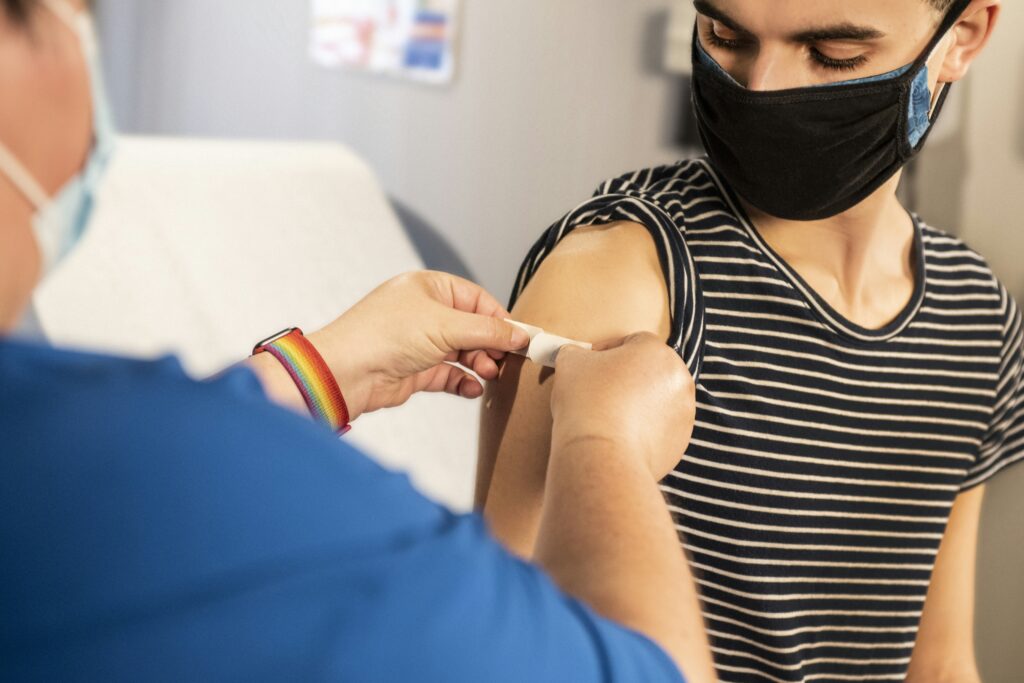The risk of cardiac and clot-related complications following COVID-19 is substantially reduced in people who receive the COVID-19 vaccination, compared with unvaccinated individuals, according to new research.

The observational study, which was supported by the NIHR Oxford Biomedical Research Centre (BRC), was published online in the journal Heart. The research team were led by Professor Daniel Prieto Alhambra of the University of Oxford’s Nuffield Department of Orthopaedics, Rheumatology and Musculoskeletal Sciences.
COVID-19 vaccines have proved to be highly effective in reducing the severity of acute SARS-CoV-2 infection, COVID-19-related hospital admission and death.
While some COVID-19 vaccines were associated with increased risk of rare but serious complications, such as blood clots and heart inflammation (myocarditis), the risk of these complications was substantially higher after SARS-CoV-2 infection.
Some studies have suggested that vaccination could protect against these complications of COVID-19, but most did not include long-term complications and were focused on specific populations.
To address this, the researchers studied the association between COVID-19 vaccination and the risk of post-COVID-19 cardiac and thromboembolic complications using population data for the UK, Spain and Estonia, which included 10.17 million vaccinated people and 10.39 million unvaccinated people.
Individuals who were vaccinated received either an adenovirus-based vaccine (Oxford/AstraZeneca or Janssen) or one of the mRNA vaccines (BioNTech/Pfizer or Moderna).
The researchers identified cases of cardiac and thromboembolic complications in the first year after SARS-CoV-2 infection and recorded them according to four post-infection time windows: 0 to 30 days; 31 to 90 days; 91 to 180 days; and 181 to 365 days after infection.
A range of potentially influential factors – such as age, sex and pre-existing conditions including chronic lung disease, diabetes, heart disease and a history of blood clots – were accounted for in the analysis to minimise bias.
The results show that COVID-19 vaccination was associated with reduced risks of heart failure, venous thromboembolism (clot within the veins of a limb) and arterial thrombosis or thromboembolism (blood clot in the artery) for up to a year after SARS-CoV-2 infection.
Reduced risk of other complications, such as ventricular arrhythmia or cardiac arrest (heart attack), myocarditis and pericarditis were also seen, but only in the first 30 days after infection.
Compared with unvaccinated individuals, having COVID-19 vaccination was associated with reduced risks of venous thromboembolism by 78 per cent, arterial thrombosis/thromboembolism by 47 per cent and heart failure by 55 per cent in the first 30 days after SARS-CoV-2 infection.

As time progressed, the protective effects of vaccination waned, but remained at 47 per cent, 28 per cent, and 39 per cent respectively at 91–180 days after infection, and 50 per cent, 38 per cent, and 48 per cent respectively at 181-365 days.
As this was an observational study, it was unable to establish cause and effect, and the authors highlight some limitations, including inherent concerns over data quality and risk of bias with use of real-world data, as well as potential under-reporting of post-COVID-19 complications.
However, state-of-the-art statistical methods were used to deal with these limitations and results were consistent across all databases, which the researchers say highlights the robustness and replicability of the findings.
As such, they conclude, “Our analyses showed a substantial reduction of risk (42–82 per cent) for thromboembolic and cardiac events in the acute phase of COVID-19 associated with vaccination.”
They add, “Reduced risk in vaccinated people lasted for up to one year for post-COVID-19 venous thromboembolism, arterial thrombosis/thromboembolism and heart failure, but not clearly for other complications.”
The authors suggest that the protective effects of vaccination are “consistent with known reductions in disease severity following breakthrough versus unvaccinated SARS-CoV-2 infection” and say further research is needed on the possible waning of the effect over time and on the impact of booster vaccination.
In January, Professor Prieto Alhambra’s team found that vaccination against COVID-19 consistently reduced the risk of long COVID symptoms.